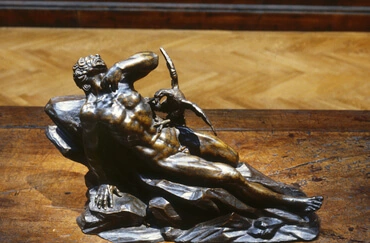1
Rejoice not, Israel, exultingly, as the peoples; for thou hast gone a whoring from thy God, thou hast loved harlot's hire upon every corn-floor.
2
The floor and the winepress shall not feed them, and the new wine shall fail her.
3
They shall not dwell in Jehovah's land; but Ephraim shall return to Egypt, and in Assyria shall they eat that which is unclean.
4
They shall pour out no [offerings of] wine to Jehovah, neither shall their sacrifices be pleasing unto him: they shall be unto them as the bread of mourners; all that eat thereof shall be defiled: for their bread shall be for themselves; it shall not come into the house of Jehovah.
5
What will ye do in the day of assembly, and in the day of the feast of Jehovah?
6
For behold, they are gone away because of destruction: Egypt shall gather them up, Moph shall bury them: their pleasant things of silver, nettles shall possess them; thorns shall be in their tents.
7
The days of visitation are come; the days of recompence are come: Israel shall know [it]: the prophet is a fool, the inspired man is mad, because of the greatness of thine iniquity, and the great enmity.
8
Is Ephraim a watchman with my God? [nay] the prophet is a fowler's snare on all his ways, enmity in the house of his God.
9
They have deeply corrupted themselves as in the days of Gibeah. He will remember their iniquity, he will visit their sins.
10
I found Israel as grapes in the wilderness; as first-ripe fruit on the fig-tree, I saw your fathers at the beginning: they went to Baal-Peor, and separated themselves unto that shame, and became abominations like their lover.
11
As for Ephraim, their glory shall fly away as a bird, -- no birth, no pregnancy, no conception!
12
For even should they bring up their children, yet will I bereave them, [that] not a man [remain]: for woe also to them when I shall have departed from them!
13
Ephraim, as I saw [him], was a Tyre planted in a beautiful place; but Ephraim shall bring forth his children to the slayer.
14
Give them, Jehovah -- what wilt thou Give? -- Give them a miscarrying womb and dry breasts.
15
All their wickedness is in Gilgal; for there I hated them: because of the wickedness of their doings, I will drive them out of my house, I will love them no more: all their princes are rebellious.
16
Ephraim is smitten: their root is dried up, they shall bear no fruit; yea, though they should bring forth, yet will I slay the beloved [fruit] of their womb.
17
My God hath rejected them, because they hearkened not unto him; and they shall be wanderers among the nations.







